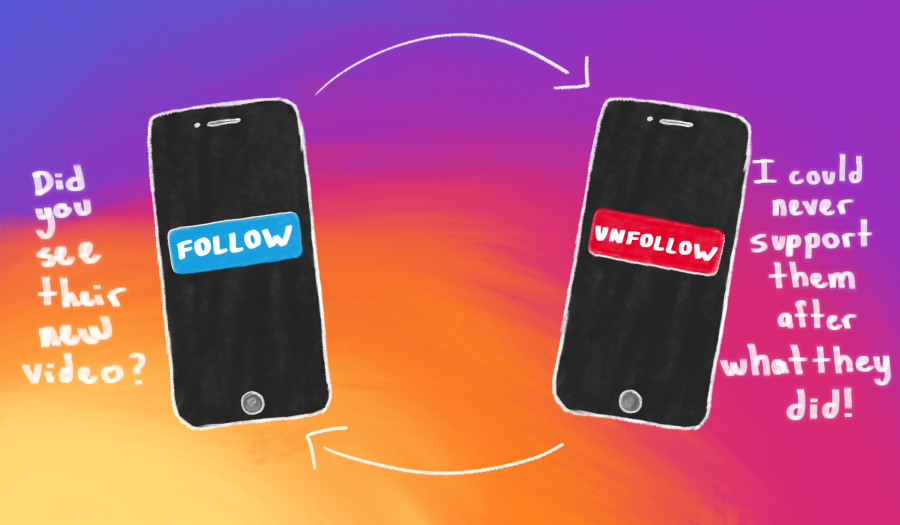From the birth of YouTube to the rapid growth of TikTok, ordinary people have been able to garner attention on social media apps with just a smartphone and an idea. The term “influencer” was coined to describe the creators in these positions that have the ability to influence the behavior or opinions of their followers.
While most influencers start off with supportive fanbases, the more attention they receive, the more their flaws and mistakes are emphasized. The phenomenon of promoting the “canceling” of people, brands, and companies due to offensive or problematic remarks or ideologies is referred to as Cancel Culture. The intention behind Cancel Culture is to hold celebrities and influencers accountable for their mistakes and call them out for their problematic behavior. However, the motivation and means of Cancel Culture have become tainted as many use it as an excuse to bully celebrities rather than bring to light their mistakes. Major reform is needed — on both a personal and social level — in order to achieve the originally intended goal of accountability.
TikTok content creators Charlie and Dixie D’Amelio were recently criticized for their behavior in a YouTube video where many claimed that they acted ungrateful and rude toward their chef. Charlie proceeded to lose roughly 1,000,000 followers within the first few days of her being “canceled.” However, after many other influencers such as James Charles came to her defense, she ended up gaining a net worth of 2,000,000 followers. This back-and-forth highlights the inconsistent nature of “canceling” someone and how ineffective this method has become.
The masses on social media pick and choose who they want to cancel and for what reasons. While there are creators accused of child grooming who still have a platform, such as Tony Lopez, people choose to focus on how the D’Amelios acted during a family dinner.
While Lopez continues to receive comments about these allegations, his TikToks continue to get millions of likes and views. His TikTok account also remains verified and has over 20,000,000 followers. Additionally, Lopez’s follower count has actually increased this past month, even after these allegations were made public. This calls into question: what constitutes being canceled?
Influencers who were once looked up to, such as Shane Dawson, Jeffery Star, and Trisha Paytas, have been “canceled” on multiple occasions. However, their presence on the internet has remained unchanged. Although these content creators are no longer idolized, they are seen as separate, exempt from what should be considered morally acceptable for ordinary people because of the amusement people get from hating on them.
Many have pointed out the flaws of Cancel Culture, highlighting how it’s toxic and doesn’t do anything to solve actual problems.
Even President Barack Obama commented on the phenomenon in October 2019, “That’s not activism. That’s not bringing about change. If all you’re doing is casting stones, you’re probably not going to get that far. That’s easy to do.”
When we look up to people who are successful, we purposely turn away from their flaws or use that energy to criticize influencers in an unproductive manner. Our obsession with celebrities, whether it’s negative or positive, has led to a toxic cycle of “stanning” them, finding out they did something problematic, and then using that energy to spam them with hateful messages or continuing to support them despite their lack of accountability.
General examples of fans excusing problematic behavior include Lana Del Rey criticizing Ariana Grande, Beyonce, and Nicki Minaj for the sexual nature of their songs as well as Ellen DeGeneres allegedly mistreating her employees. Del Rey’s fans continue to support her despite her half-felt apology that did not address the problematic nature of her comment. DeGeneres’ show also continues to receive support and is currently on its 18th season.
We need to put our own personal preferences aside and objectively look at the wrongdoings of people in the spotlight. Supporting celebrities who consciously break social distancing and quarantine rules while criticizing female rap artists for their explicit content calls into question the priorities of our society.
Although tabloids and gossip magazines were the first to openly criticize celebrities for their mistakes, a new form of Cancel Culture was born alongside online social media platforms. Thanks to our digital world, we have instant access and connection to influencers and celebrities that make it easy to voice both our negative and positive opinions directly to whomever we are talking about. There’s no way to completely eliminate a culture of calling out problematic behavior, nor should we strive to do so.
There’s a lot wrong with Cancel Culture, but the first step is identifying why it’s bad and how we can change the conversation.
Given the situation with the D’Amelios, it is obvious that moderating young children when it comes to social media apps is crucial. They are the most impressionable and, thus, the most impacted when it comes to influencers and celebrities exhibiting inappropriate behavior.
Regardless of whether you watched someone on YouTube for several years or “never thought they would do something like that,” everyone should be held accountable, and fame should not be used to excuse someone from taking responsibility.
If we are going to put energy into letting people know that they have done something inappropriate and problematic, we also need to let people know how to repair the harm they have done and give them room for growth.
Finally, instead of condemning one person in the spotlight for their behavior and forgetting about it two months later, we should use these opportunities to shed light on the topic as a whole rather than use Cancel Culture as a surface level bandage. Creating dialogue and educating ourselves, our kids, and influencers to become better people is essential to eliminate the toxicity of Cancel Culture.
For example, content creator Dr. Mike Varshavski, better known as Dr. Mike, was recently called out for partying with a large crowd without a mask. He issued an apology video shortly after on his secondary YouTube channel. This situation is the perfect segue into addressing the consistent and inconsiderate partying that celebrities and influencers are guilty of. Many have used this opportunity to shed light on the bigger issue.
It can be easy to idolize figures we see on the internet on a daily basis. While a lot of creators have earned the right to be considered role models, we must be aware of the issues surrounding our generation and be sure to hold people accountable justly.
Art by Ava Bayley for the UC San Diego Guardian

















Joseph • Dec 17, 2020 at 6:46 am
It is important to follow modern trends and follow them. Or entrust it to specialized companies like this https://www.crunchbase.com/organization/mediaone-business-group . To promote a product or service, it is not enough to use a single channel of interaction with the client – the result is guaranteed only by a combination of different strategies.